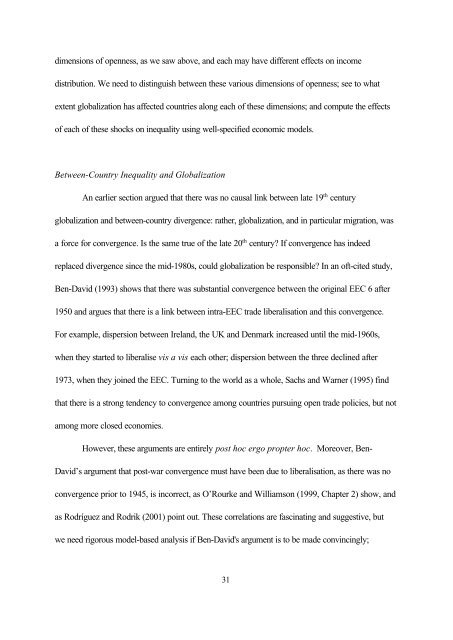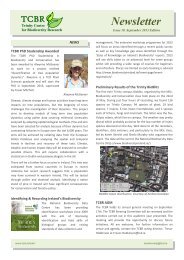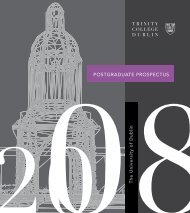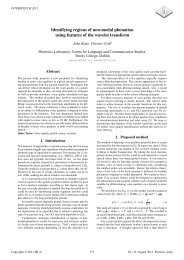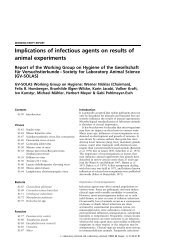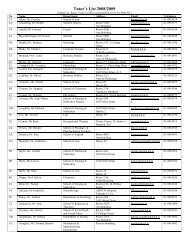Globalization and Inequality - Trinity College Dublin
Globalization and Inequality - Trinity College Dublin
Globalization and Inequality - Trinity College Dublin
You also want an ePaper? Increase the reach of your titles
YUMPU automatically turns print PDFs into web optimized ePapers that Google loves.
dimensions of openness, as we saw above, <strong>and</strong> each may have different effects on income<br />
distribution. We need to distinguish between these various dimensions of openness; see to what<br />
extent globalization has affected countries along each of these dimensions; <strong>and</strong> compute the effects<br />
of each of these shocks on inequality using well-specified economic models.<br />
Between-Country <strong>Inequality</strong> <strong>and</strong> <strong>Globalization</strong><br />
An earlier section argued that there was no causal link between late 19 th century<br />
globalization <strong>and</strong> between-country divergence: rather, globalization, <strong>and</strong> in particular migration, was<br />
a force for convergence. Is the same true of the late 20 th century? If convergence has indeed<br />
replaced divergence since the mid-1980s, could globalization be responsible? In an oft-cited study,<br />
Ben-David (1993) shows that there was substantial convergence between the original EEC 6 after<br />
1950 <strong>and</strong> argues that there is a link between intra-EEC trade liberalisation <strong>and</strong> this convergence.<br />
For example, dispersion between Irel<strong>and</strong>, the UK <strong>and</strong> Denmark increased until the mid-1960s,<br />
when they started to liberalise vis a vis each other; dispersion between the three declined after<br />
1973, when they joined the EEC. Turning to the world as a whole, Sachs <strong>and</strong> Warner (1995) find<br />
that there is a strong tendency to convergence among countries pursuing open trade policies, but not<br />
among more closed economies.<br />
However, these arguments are entirely post hoc ergo propter hoc. Moreover, Ben-<br />
David’s argument that post-war convergence must have been due to liberalisation, as there was no<br />
convergence prior to 1945, is incorrect, as O’Rourke <strong>and</strong> Williamson (1999, Chapter 2) show, <strong>and</strong><br />
as Rodríguez <strong>and</strong> Rodrik (2001) point out. These correlations are fascinating <strong>and</strong> suggestive, but<br />
we need rigorous model-based analysis if Ben-David's argument is to be made convincingly;<br />
31


